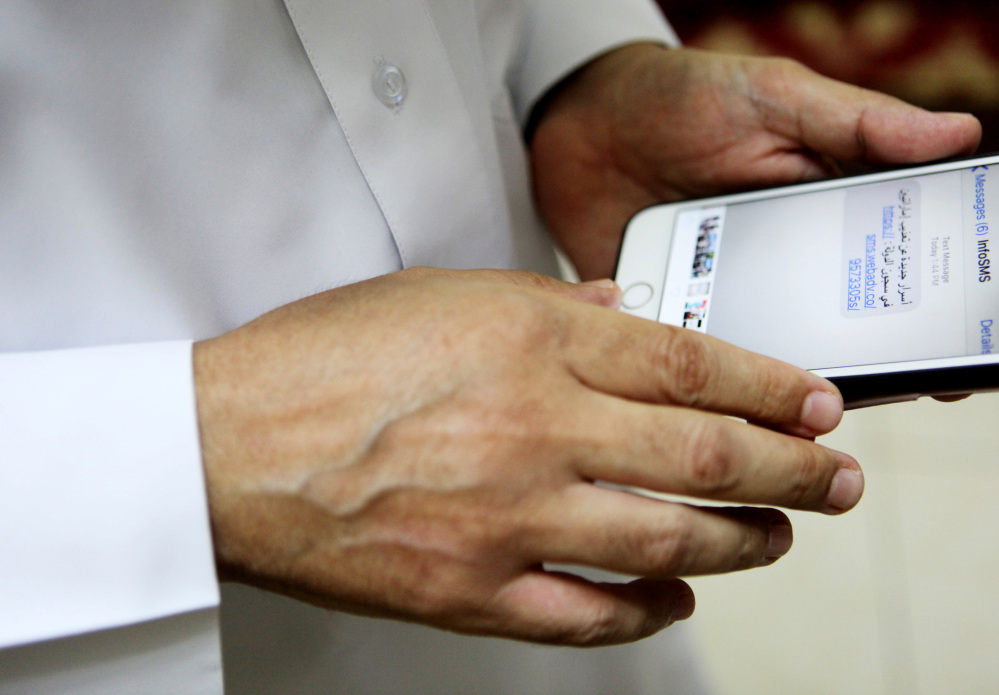PARIS — A botched attempt to break into the iPhone of an Arab activist using hitherto unknown espionage software has trigged a global upgrade of Apple’s mobile operating system, researchers said Thursday.
The spyware took advantage of three previously undisclosed weaknesses in Apple’s mobile operating system to take complete control of iPhone devices, according to reports published Thursday by the San Francisco-based Lookout smartphone security company and internet watchdog group Citizen Lab. Both reports fingered the NSO Group, an Israeli company with a reputation for flying under the radar, as the author of the spyware.
“The threat actor has never been caught before,” said Mike Murray, a researcher with Lookout, describing the program as “the most sophisticated spyware package we have seen in the market.”
The reports issued by Lookout and Citizen Lab – based at the University of Toronto’s Munk School of Global Affairs – outlined how an iPhone could be completely compromised with the tap of a finger, a trick so coveted in the world of cyberespionage that in November a spyware broker said it had paid a $1 million bounty to programmers who’d found a way to do it. Such a compromise would give hackers full control over the phone, allowing them to eavesdrop on calls, harvest messages, activate cameras and microphones and drain the device of its personal data.
Arie van Deursen, a professor of software engineering at Delft University of Technology in the Netherlands, said both reports were credible and disturbing. Forensics expert Jonathan Zdziarski described the malicious program as a “serious piece of spyware.”
Apple said in a written statement that it fixed the vulnerability immediately after learning about it, but the security hole may have gone unpatched had it not been for the wariness of an embattled human rights activist in the United Arab Emirates.
Ahmed Mansoor, a well-known human rights defender, first alerted Citizen Lab to the spyware after receiving an unusual text message on Aug. 10. Promising to reveal details about torture in the United Arab Emirates’ prisons, the unknown sender included a suspicious-looking link at the bottom of the message.
Mansoor wasn’t convinced. Not only had he been imprisoned, beaten, robbed and had his passport confiscated by the authorities over the years, Mansoor had also repeatedly found himself in the crosshairs of electronic eavesdropping operations. In fact, Mansoor already had the dubious distinction of having weathered attacks from two separate brands of commercial spyware. And when he shared the suspicious text with Citizen Lab researcher Bill Marczak, they realized he’d been targeted by a third.
Marczak, who’d already been looking into the NSO Group, said he and fellow researcher John Scott-Railton turned to Lookout for help picking apart the malicious program, a process that Murray compared to “defusing a bomb.”
“It is amazing the level they’ve gone through to avoid detection,” he said of the software’s makers. “They have a hair-trigger self-destruct.”
Working feverishly over a two-week period, the researchers found that Mansoor had been targeted by an unusually sophisticated piece of software.
In a statement that stopped short of acknowledging that the spyware was its own, the NSO Group said its mission was to provide “authorized governments with technology that helps them combat terror and crime.”
The company said it had no knowledge of any particular incidents, and declined further comment.
Send questions/comments to the editors.



Success. Please wait for the page to reload. If the page does not reload within 5 seconds, please refresh the page.
Enter your email and password to access comments.
Hi, to comment on stories you must . This profile is in addition to your subscription and website login.
Already have a commenting profile? .
Invalid username/password.
Please check your email to confirm and complete your registration.
Only subscribers are eligible to post comments. Please subscribe or login first for digital access. Here’s why.
Use the form below to reset your password. When you've submitted your account email, we will send an email with a reset code.